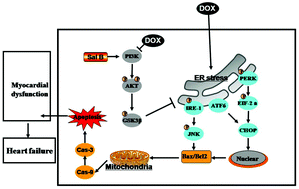Salvianolic acid B protects against doxorubicin induced cardiac dysfunction via inhibition of ER stress mediated cardiomyocyte apoptosis†
Abstract
Salvia miltiorrhiza Bunge is a well-known medicinal plant in China. Salvianolic acid B (Sal B) is the most abundant bioactive compound extracted from the root of S. miltiorrhiza. The present study investigates the effect of Sal B on cardiac function and cardiomyocyte apoptosis in doxorubicin (DOX)-treated mice. After pretreatment with Sal B (2 mg kg−1 iv) for 7 d, male BALB/c mice were injected with a single dose of DOX (20 mg kg−1 ip). The cardioprotective effect of Sal B was observed on the 7th day after DOX treatment. DOX caused retarded body growth, apoptotic damage, and Bcl-2 expression disturbance. In contrast, Sal B pretreatment (2 mg kg−1 iv before DOX administration) attenuated the DOX induced apoptotic damage in heart tissues. Further study indicated that Sal B protected against DOX induced cardiotoxicity, at least, partially, by inhibiting endoplasmic reticulum stress, and by being involved in the PI3K/Akt pathway. These findings clarified the potential of Sal B as a promising reagent for treating DOX induced cardiotoxicity.


 Please wait while we load your content...
Please wait while we load your content...